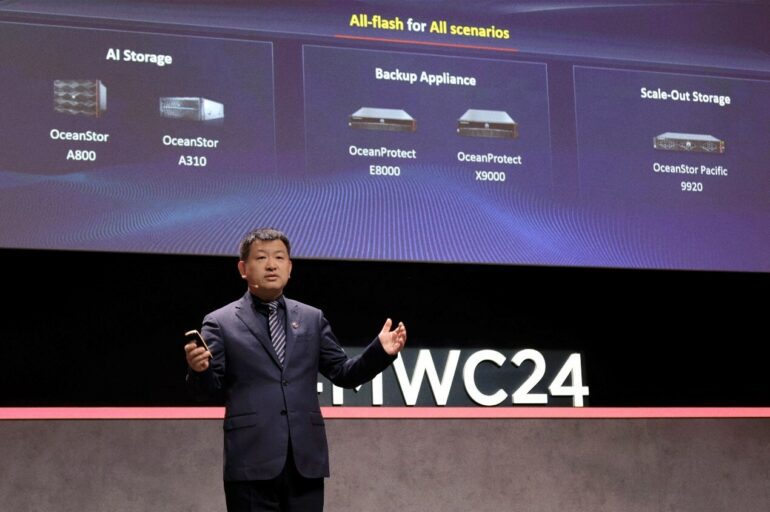- Huawei introduces three pioneering data storage solutions at MWC Barcelona 2024: AI data lake, all-scenario data protection, and DCS full-stack data center.
- AI data lake solution enables efficient data management and accessibility for AI training.
- All-scenario data protection solution enhances data resilience across production, backup, and archiving phases.
- DCS full-stack data center solution offers comprehensive infrastructure as a service (IaaS) and platform as a service (PaaS).
- These solutions address the challenges of consolidating data sources, prolonged data retention, and escalating data assetization in the AI era.
Main AI News:
The recent Huawei Product and Solution Launch, held triumphantly at MWC Barcelona 2024, saw Dr. Peter Zhou, President of Huawei IT Product Line, introduce three groundbreaking solutions aimed at empowering global carriers to forge ahead in the AI-driven data landscape: the AI data lake solution, all-scenario data protection solution, and DCS full-stack data center solution.
The burgeoning expansion of sophisticated AI models is unlocking the latent value embedded within data reservoirs, heralding an epoch of data enlightenment. Amidst this transformative tide, constructing resilient data infrastructure for the AI epoch faces twin challenges. Firstly, the imperative lies in consolidating disparate data sources into AI data hubs to extract actionable insights, necessitating seamless data mobility. Secondly, the proliferation of data assetization necessitates prolonged retention periods, with annotated AI data and model data now averaging over three years and certain pivotal corpus data mandating perpetual storage.
In response to these imperatives, Huawei has rolled out a suite of pioneering storage solutions, tailored to empower carriers in sculpting avant-garde data infrastructure for the AI epoch.
- AI Data Lake Solution: Facilitating the seamless transformation of voluminous data into invaluable assets, this solution encompasses the Data Management Engine (DME), an end-to-end knowledge generation toolchain (eDataMate), data fabric, and the AI storage solutions OceanStor A800 and OceanStor A310. It renders AI training data universally visible, manageable, and accessible, augmenting data acquisition, preprocessing, and training efficacy. Notably, the OceanStor A800, a state-of-the-art high-performance NAS storage solution, serves as a stalwart foundation for AI storage prowess, boasting a separation architecture between data and control planes, the OceanFS high-performance parallel file system, versatile bidirectional scalability, and other functionalities, all tailored to facilitate real-time hyper-cluster scheduling.
- All-Scenario Data Protection Solution: Enabling fortified resilience for data assets across production, backup, and archiving realms, this solution adopts a dual-layered collaborative deployment approach. The initial layer orchestrates production-backup collaboration, accelerating the backup process for myriad small files by up to 90% compared to conventional alternatives, while also facilitating real-time analytics in native formats. The subsequent layer, backup-archive collaboration, leverages post-deduplication tiering to slash bandwidth consumption by 80%. Huawei further unveiled the OceanProtect E8000 and X9000 data backup appliance solutions, alongside the next-generation OceanStor Arctic magneto-electric storage solution, tailored for warm and cold data repositories. Anticipated to curtail TCO by 20% vis-a-vis tapes and diminish power consumption by 90% compared to HDDs, the magneto-electric storage solution heralds a paradigm shift in data archival.
- DCS Full-Stack Data Center Solution: Propelling carriers towards heightened IT service efficiency and agility, this comprehensive solution, underpinned by virtualization and containerization paradigms, spans data aggregation, storage, computation, management, and utilization realms. It furnishes a holistic Infrastructure as a Service (IaaS) and Platform as a Service (PaaS) ecosystem, epitomizing Huawei’s unwavering commitment to empowering carriers with transformative infrastructure solutions.
Dr. Zhou emphasized that the advent of AI heralds a dawn of data enlightenment, propelling the relentless march toward data assetization. Huawei Data Storage remains steadfast in its commitment to furnishing versatile storage solutions across diverse scenarios, thereby empowering carriers to spearhead the evolution of data infrastructure in the AI epoch.
Conclusion:
Huawei’s unveiling of revolutionary data storage solutions signifies a pivotal moment in the market landscape. With the advent of sophisticated AI models and the imperative to harness the value embedded within data reservoirs, Huawei’s offerings empower carriers to navigate the complexities of the AI-driven data terrain. By addressing challenges such as data consolidation, prolonged retention, and escalating assetization, Huawei not only reaffirms its commitment to innovation but also catalyzes a transformative shift in data infrastructure paradigms. This move underscores Huawei’s strategic positioning to lead the charge in shaping the future of data storage solutions, thereby setting new benchmarks for industry standards and propelling the market towards unprecedented realms of efficiency and agility.

